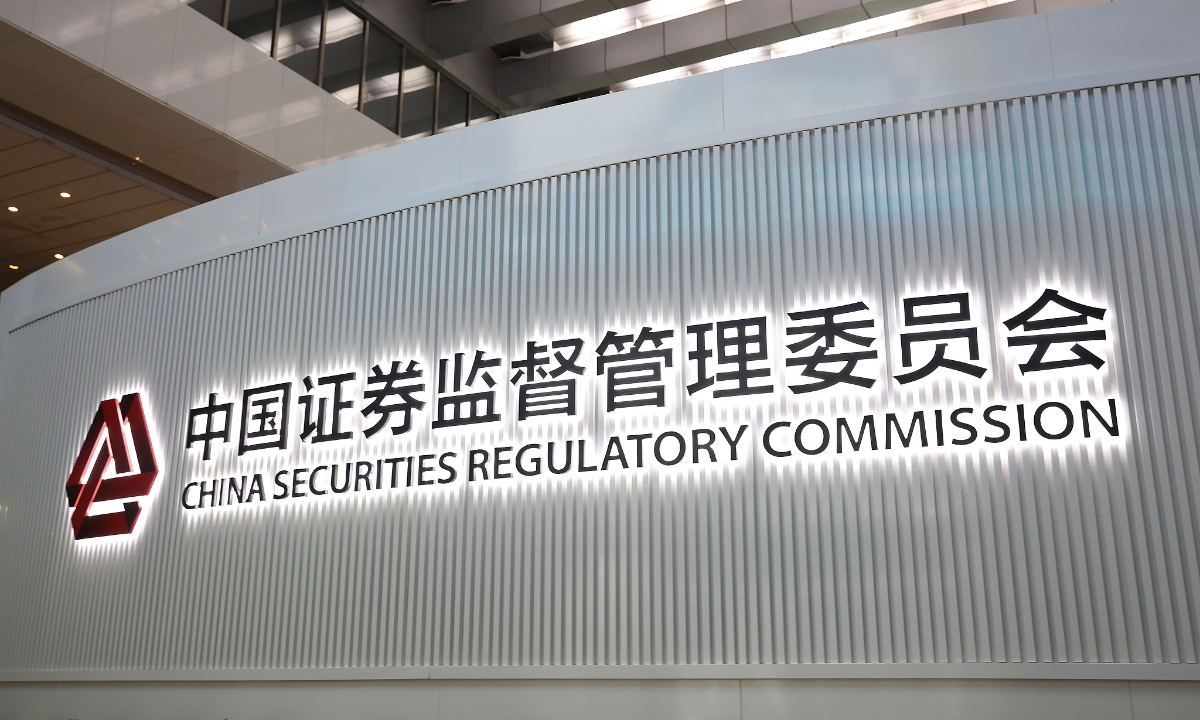China eyes stricter oversight over IPOs, listed firms and brokers with 4 documents issued
Efforts to protect investors with ‘teeth and horns,’ revive confidence

China Securities Regulatory Commission (CSRC) in Beijing Photo:VCG
The China Securities Regulatory Commission (CSRC), the country's top securities regulator, issued on Friday four policy documents to enhance supervision and management of the capital market and prevent risks, vowing to promote the high-quality development of the stock market.The documents, which will strengthen scrutiny over stock listings, public companies and brokerages, demonstrated China's determination to protect investors with "teeth and horns" and boost market confidence, as well as cultivate a good environment for the healthy and stable development of the capital market, analysts said.
The prompt move, which came just days after the two sessions concluded, showcased the country's institutional advantage of efficiency in policymaking and implementation, and is also a vital part of China's accelerated efforts to build itself into a financial powerhouse, they noted.
Stepped-up efforts
Among the four documents, three are guidelines aimed to boost supervision of initial public offerings (IPOs), listed companies, brokers and public offering funds. The last one aims to enhance self-construction of the CSRC system.
Noting these four documents, Li Chao, vice chairman of the CSRC, said on Friday that the goal is to make China's capital market "safe, regulated, transparent, open, dynamic and resilient."
In order to improve the quality of listed companies at source, the CSRC will tighten supervision on initial public offerings (IPOs), preventing companies from excessive financing, while accounting fraud and false statements will be severely punished, Li said, while briefing the four documents.
In addition, it will adopt necessary adjustments in the IPO market, taking into account supply and demand in the secondary market, and will also enhance onsite inspections of listing candidates, said the official.
Moreover, regulators will strengthen scrutiny of listed companies, focusing on helping listed enterprises improve investment value and enhance investor protection. The CSRC will ramp up its crackdown on accounting fraud and illegal reducing of holdings, urging listed companies to increase dividend payouts and encouraging them to buy back shares, Li said.
"The key point of these four documents is to strictly vet the IPO applications, and the quality of listed companies, as these two parts are fundamental to enhancing the management of the capital market," Dong Shaopeng, a senior research fellow at the Chongyang Institute for Financial Studies at the Renmin University of China, told the Global Times on Friday.
IPOs are like the first button of the stock market system, and should be fastened properly from the beginning, Dong noted, adding that the listing of a company is based on what it needs for development and what it can supply, and a company that does not have the ability to continue to innovate and develop, or to continue to supply dividends, should not be listed.
Yang Delong, chief economist at the Shenzhen-based First Seafront Fund Management Co, said that these rules are specific and targeted solutions to some of the problems that previously existed in listed companies, and are important for improving the investability of the A-share market and promoting the long-term healthy development of the market.
"These measures will effectively improve the quality of listed companies and protect the interests of small and medium-sized investors, thereby boosting market confidence," Yang told the Global Times on Friday.
According to the documents, the CSRC will also strengthen regulations on securities firms and public offering funds, in a bid to promote its functioning, professional service capacity and regulatory effectiveness. It will crack down on wrongdoings by shareholders that go against the interests of institutions and investors, warning against money worship, extravagance, hedonism and showing off of wealth.
Yang noted that the above-mentioned moves showed the regulator's determination to build an investor-centered capital market, and correcting bad conducts will promote good professional practices in the industry, further boosting the healthy development of the securities and funds sector.
The securities watchdog also released a guideline to improve its own capabilities. Strengthening self-construction is an important guarantee for the CSRC to fully carry out its main responsibility for supervision and promote the high-quality development of the capital market, Li said, citing the document.
Dong noted that China is the second largest economy in the world and needs a strong stock market that matches the size of the economy, and a fair system and strong regulations are the key.
Path to financial powerhouse
The CSRC's move is a new part of an array of market-friendly measures to pave the way for long-term, high-quality growth in China's capital market.
During the just-concluded two sessions this year, China stressed in its 2024 Government Work Report that the underlying stability of the capital market should be enhanced.
Wu Qing, head of the CSRC, on March 6 said in his first public appearance before media since taking his new post that enhancing institutional buildup and attracting long-term investment into the market will be among the measures that will be taken to accomplish the task outlined in the Government Work Report.
Wu reiterated the importance of prioritizing investors, combating financial fraud, and encouraging listed companies to engage in cash dividends and buybacks.
In order to promote the sound development of the capital market and protect investors' rights and interests, the CSRC has held symposiums to solicit opinions and suggestions on improving the basic system of the capital market, strengthening the protection of the rule of law, and has also paid visits to listed firms to help them address difficulties in achieving high-quality development.
Since Wu took office on February 7, the Chinese A-share market has recovered much of its losses from the recent cycle, with the benchmark Shanghai Composite Index up 0.54 percent to 3,054.64 points and the Shenzhen Component Index closing 0.6 percent higher at 9,612.75 points on Friday.
As "finance" was mentioned 21 times in the 2024 Government Work Report, experts noted that in the new year, China will accelerate efforts to build itself into a financial powerhouse, and the stability of the capital market will contribute to the high-quality development of its financial sector.


